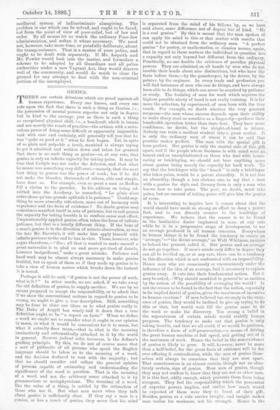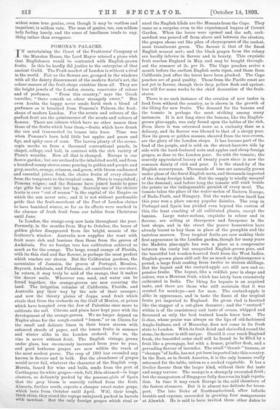GENIUS. T HERE are certain delusions which are proof against all
human experience. Every one knows, and every one acts upon the fact that there is such a thing as Genius, i.e., the possession of mental powers superior not only in degree but in kind to the average, just as there is such a thing as exceptional physical skill, i.e., a handcraft which is innate and not merely the result of practice—the artisan with a mira- culous power of doing some difficult or apparently impossible task with ease and certainty, will generally tell you that he was "quite as good at it " when he first began. Yet, in spite of so plain and palpable a truth, mankind. is always trying to get it admitted and written down and taken for granted that there is no such thing as genius—or, at any rate, that genius is only an infinite capacity for taking pains. It may be true that Carlyle was not under the delusion, and that what he meant was something very different,—namely, that the next best thing to genius was the power of work; but if he did not make the blunder, thousands of others, able and simple, have done so. For example, even so great a man as Button fell a victim to the paradox. In his address on being ad- mitted into the Academy, he remarked, " Le genie n'est autre chose qu'une grande aptitude ee la patience." Could any- thing be more absurdly ridiculous, more out of harmony with experience and the facts of existence P No doubt genius may sometimes manifest itself in acts of patience, but to call genius the capacity for taking trouble is to confuse cause and effect. Unquestionably applied genius often takes the form of infinite patience, but that is a totally different thing. If the bent of a man's genius is in the direction of minute observation, as was the late Mr. Darwin's, it will make him apply himself with infinite patience to the end he has in view. Those, however, who argue therefrom,----"See; all that is wanted to make oneself a great naturalist is to plod on and never get tired of details, however insignificant," make a great mistake. Patience and hard work may be almost always necessary to make genius fruitful, but to speak of them as if they made up genius is to take a view of human nature which breaks down the instant it is tested.
Perhaps it will be said, "if genius is not the power of work, what is it ? " In ether words, we are asked, if we take away the old definition of genius, to supply another. We are by no means prepared to accept the responsibility, or to admit that if we show the conventional notions in regard to genius to be wrong, we ought to give a true description. Still, something may be done to clear our ideas as to what genius really is. The Duke of Argyll has wisely laid it down that a true definition ought to be "a report on facts." When we define a word, we ought not to consider what it ought in our opinion to mean, or what it would be convenient for it to mean, but what it actually does mean,—that is, what is the meaning instinctively and automatically attached to it by the world in general. Securus judicat orbis terrarum, is the definer's guiding principle. By this, we do not of course mean that a sort of plebiscite of all persons who speak the English language should be taken as to the meaning of a word, and the decision declared to rest with the majority ; but that we should consider and collect the general opinion of persons capable of estimating and understanding the significance of the word in question. That is the meaning of a word, and not the arbitrary sense attached to it by grammarians or metaphysicians. The meaning of a word, like the value of a thing, is settled by the estimation of those who use it. But what men mean when they talk about genius is sufficiently clear. If they say a man is a genius, or has a touch of genius, they mean that his mind is separated from the mind of his fellows by, as we have said above, some difference not of degree but of kind. "He is a real genius." By this is meant that the man spoken of can apply his mind to this or that matter with results that could not be obtained from the ordinary man. "A perfect genius" for poetry, or mathematics, or classics means, again, that in regard to those matters the individual in question has a capacity not only beyond but different from the ordinary. Practically, no one doubts the existence of peculiar physical powers. They are admitted on all hands by men who do net trouble their heads about nice distinctions, but who have the facts before them,—by the gamekeeper, by the driver, by the printer, by the engineer. In every trade and profession you will find instances of men who can do things, and have always been able to do things, which can never be acquired by patience or study. The training of men for work which requires the highest possible nicety of hand is not really training. It is far more the selection, by experiment, of men born with the true touch. For example, we doubt whether the very greatest surgeons—the men whose success depends upon their ability to make sharp steel as sensitive as a finger-tip—perform their hundredth operation better than their first. They have more confidence, no doubt, but the sleight-of-hand is inborn. Nobody can train a medical student into a great oculist. It is only the ordinary man of whom it can be said that practice makes perfect. The man with the special gift is born perfect. But genius is only the mental side of this gift apart, and if the people whose business is with mind were as honest and as unsophisticated as those who deal with horse- racing or bricklaying, we -should not hear anything more about genius being merely the capacity for hard work. To say that the bricklayer with the "knack " is only a bricklayer who takes pains, would be a patent absurdity. It is not less an absurdity, though a less obvious one, to say that a man with a genius for style and literary form is only a man who knows how to take pains. The poet, no doubt, must take pains, but no amount of taking pains will give him the genius of verse.
It is interesting to inquire how it comes about that the world should have made so strong an effort to deny a patent fact, and to run directly counter to the teachings of experience. We believe that the reason is to be found in the instinctive desire implanted in man, at any rate while he is in a progressive stage of development, to see an average produced in all human concerns. Everywhere in human things is to be found the tendency to create an " average,"—" the divine average," as Walt Whitman, anxious to belaud the present, called it. But genius and an average do not go together. If men's minds only differ in degree they can all be levelled. up, or at any rate, there can be a tendency in this direction which is not confronted with an impossibility. Hence men who are consciously or unconsciously under the influence of the idea of an average, find. it necessary to explain genius away. It cuts into their fundamental notion. But it may be asked,—Why should mankind in general be so smitten by the notion of the possibility of averaging the world ? Is not the reason to bo found in the fact that the notion, especially in its implied denial of genius, gives the maximum of incentive to human exertion P If men believed too strongly in the exist- ence of genius, they would be inclined to give up trying to do this or that, but would wait till the genius came to do the work or make the discovery. Too strong a belief in the separateness of certain minds would stultify human progress. The tendency to make out that genius is only taking trouble, and that we all could, if we would, be geniuses, is therefore a form of self-preservation,—a means of driving the great human machine at full speed, and getting out of it the maximum of work. Hence the belief in the non-existence of genius is likely to grow. It will, however, never be more than a half-belief, for the great facts of existence will be for ever offering it contradiction, while the men of genius them- selves will always be conscious that they are men apart. That consciousness is an almost certain, though not an abso- lutely certain, sign of genius. Most men of genius, though they may not confess it, know that they are not as other men. It is this fact, oddly enough, which prevents them from being arrogant. They feel the responsibility which the possession of superior powers implies, and realise how much would be expected of them were they to boast of their gift. Besides, genius as a rule carries insight, and insight makes man realise his weakness, not his strength. Hence in the widest sense true genius, even though it may be restless and impatient, is seldom vain. The man of genius, too, can seldom help feeling lonely, and the sense of loneliness tends to any thing rather than arrogance.



















































 Previous page
Previous page